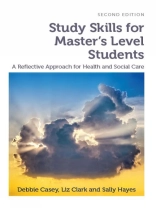Study Skills for Master’s Level Students will help students to develop the skills they need to make the transition from undergraduate to postgraduate thinking, researching and writing.
The second edition of this very popular book has been comprehensively updated to include the latest research publications and policy documents. The authors consider the characteristics, expectations and requirements of Master’s level study and examine key topics such as:
- Critical thinking
- Developing independent study skills
- Finding and using literature
- Applying postgraduate skills in the workplace
- Writing at Master’s level
- How to get published.
Study Skills for Master’s Level Students is ideal for independent study or for use by lecturers in workshop settings.
From reviews of the first edition:
‘A very comprehensive and accessible guide which is contemporary and related to application within the workplace.’
‘Easy to read and well presented.’
‘Very useful; activities excellent.’
‘I thought the complete book is a must for all postgraduate students.’
‘This book is excellent and I wish I had had a chance to read [it] pre my MSc course.’
Daftar Isi
Abbreviations; Introduction
1. What is masterly?
1.1 Introduction
1.2 Studying at Master’s level
1.3 Being a Master’s student
1.4 What is ‘masterly’?
2. What is critical thinking?
2.1 Introduction
2.2 What is critical thinking?
2.3 Conceptions of knowledge
2.4 The link to creative thinking
2.5 Why is critical thinking important?
2.6 How do I become a critical thinker?
3. Becoming an independent learner
3.1 Introduction
3.2 The adult learner
3.3 Becoming a Master’s student
3.4 Managing your studies
4. Finding and critiquing literature
4.1 Introduction
4.2 Reading as a postgraduate skill
4.3 Retrieving relevant current literature
4.4 Life scripts
5. Writing at Master’s level
5.1 Introduction
5.2 Expectations of written work at Master’s level
5.3 Types of academic writing
6. Hot to get published
6.1 Introduction
6.2 What should I write about?
6.3 Where do I publish my work?
6.4 The process of writing
6.5 Coping with rejection or requests to revise
6.6 Support for writing
6.7 Other types of scholarly activity
7. Applying postgraduate knowledge and skills in the workplace
7.1 Introduction
7.2 Knowledge and skills development in Master’s education
7.3 Problem-solving and decision-making
7.4 The importance of postgraduate skills in service development or in doing things differently
7.5 Postgraduate skills and professional practice
7.6 Postgraduate skills in a ‘patient-led’, ‘consumerist’ society
References; Index
Tentang Penulis
Dr Sally Hayes is Director of Students at the Open University. Her academic career began at Leeds Metropolitan University where she gained experience of working with students at different academic levels within nursing and other health related professions across pre- and post-registration education. She is particularly interested in facilitating the development of all learners, be they students of different disciplines, clinical practitioners or educationalists who base their practice on a journey of lifelong learning through critical reflection. She completed her Doctorate in 2013 which examined educational standards in nursing and is currently preparing a portfolio submission for the Principal Fellow of the Higher Education Academy.












